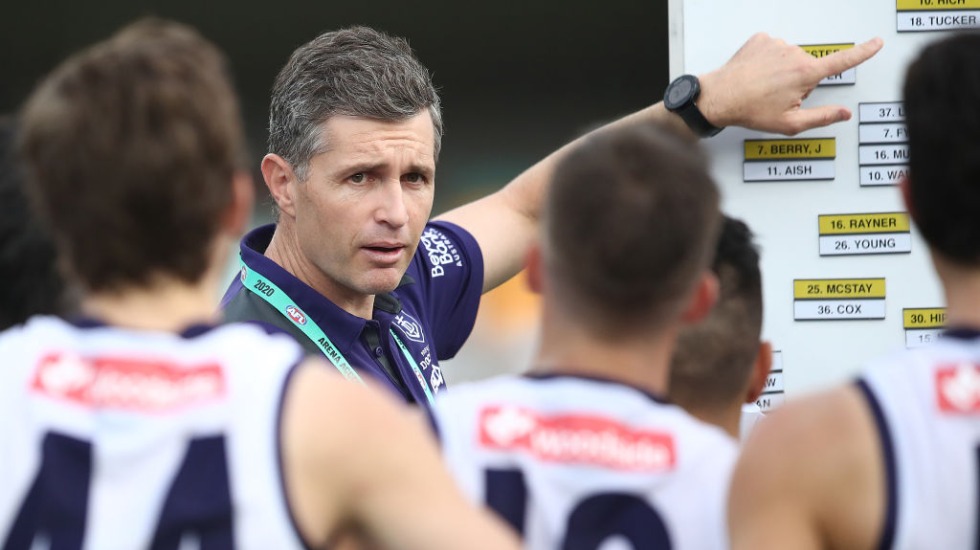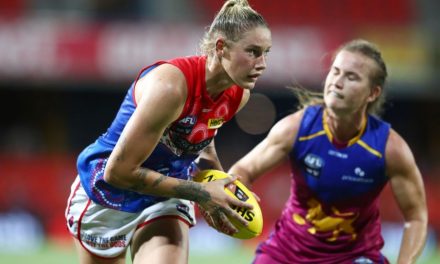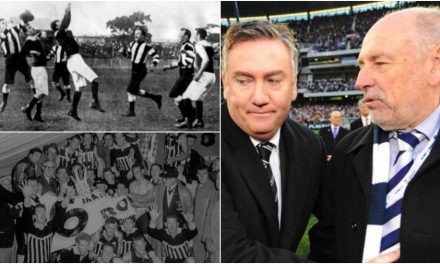“It’s all about broadening your horizons, learning from different fields,” says Fremantle’s Justin Longmuir. Photo: AFL MEDIA
“The challenge is to stay cool enough to handle the pressure in the moment so that you can succeed in the future.”– Jurgen Klopp
The internal and external noise, intense scrutiny and expectation of coaching at AFL level – let alone the need to design and manage a program that drives competitive advantage – makes for a rare breed.
And yet in this, the oddest of seasons, we are blessed for once not to have blood in the water and the subsequent circling of sharks.
For barring the unforeseen, all current 18 AFL coaches will head into Round 1, 2021 in charge of their respective teams, quite the contrast to last year, when four senior coaches were moved on.
Despite a deliberate and concerted effort to boost support processes for coaches, primarily via the auspices of the AFL Coaches Association, when the pressure rises and the end comes, it can be a brutal ordeal.
It is hard to erase the image of then Melbourne chief executive Peter Jackson pushing ousted and deer-in-the-headlights coach, Mark Neeld, to his seat before an expectant media throng in June 2013.
“I certainly didn’t see it finishing like this,” said Neeld at the time. “The emotion right now is disappointment. Over the weeks and months, I’ll be on a rollercoaster.”
So, what is it really like in the hot seat? How on earth can a senior coach juggle so many competing demands and implement a playing style that succeeds? And what informs a coach’s philosophy?
This week Fremantle coach Justin Longmuir gave Footyology an inside view.
“It’s challenging, of course, but I like a challenge,” he said. “I think there is enough support for coaches but sometimes ego takes over and a coach is unwilling to reach out for help. That’s the biggest issue.
“And look, it’s not rocket science. There must be alignment between the key pillars of the club – the president, CEO, footy manager and coach – with open, honest conversations that build trust. That makes a coach feel confident.”
Longmuir served a long and instructive apprenticeship before taking over from Ross Lyon at the Dockers, notably at West Coast and then at Nathan Buckley’s side when the Pies catapulted into premiership contention in 2018.
He remains full of praise for the guidance and influence of the late Phillip Walsh. The pair struck up a friendship while in assistant coaching roles at West Coast.
“Phil taught me a couple of things,” said Longmuir. “First, knowledge of the game – be a student of the game – and secondly, study other coaches from other codes around the world – be a student of coaching.
“It’s all about broadening your horizons and learning from different fields.”
PLEASE HELP US CONTINUE TO THRIVE BY BECOMING AN OFFICIAL FOOTYOLOGY PATRON. JUST CLICK THIS LINK.
Tactically, dual premiership coach of Richmond, Damien Hardwick, acknowledges the debt he owes to the study of basketball, specifically chains of ball movement and positioning, both offensively and defensively.
When asked if he borrows tactics from other codes, Longmuir suggests he takes more out of the philosophies of coaching rather than tactical strategies that might fit Australian Rules football.
“Teaching players, building relationships and building culture is pretty much the same across all sports,” he said. “Isolating an advantage in numbers, decision making, positioning … that’s transferrable as well.
“On a trip to America I caught up with golfer Jordan Spieth’s coach [Cameron McCormick] and it was fascinating to see him break down a session to allow the athlete to self-assess and get a fuller understanding of their own game.
“It’s exactly what we’re trying to do; build enough knowledge so our players can self-assess on the field and change on the run. Understand their own game and that of the team, and drive and improve their own career.
“But that takes a lot of coaching.”
I put it to Longmuir that playing style must be adapted to fit the strengths, experience and skillset of a playing list, rather than imposed on players who cannot adapt, irrespective of cause.
He agreed, but emphasised that skillset is the main determinant. His philosophy is to create a structure which allows players flexibility to maximise their strengths but not so loose that chaos reigns when under pressure.
“That structure is always evolving – it must allow for different skillsets,” he said. “For example, we wanted to be more aggressive in our defence at the start of this season.
“But the way injuries hit us meant that we had to support each other and had to sit back deeper … we won the ball back further away from our own goals than we wanted to. It was a similar structure, but we sat deeper because of personnel.”
Finally, the matter of pressure. Longmuir thinks this year, his first in charge, has perhaps been a little easier than had he been 10 years down the road and set in his ways. The strangest of seasons has in some respects worked to his advantage.
“This year has been a journey like no other,” he said. “But I’ve really enjoyed it. I love involving and empowering the players on their journey. We’ve got a really good platform to build on.”
In an industry that sees so much churn and speculation, Longmuir’s optimism is welcome.











